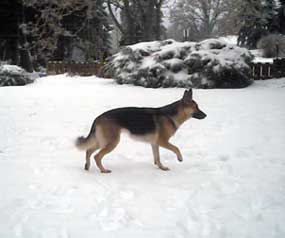Annual Fecal Exams
Are Highly Recommended
Fecal exams are used primarily to identify the eggs of various intestinal parasites such as whipworms, hookworms, or tapeworms. Many different kinds of parasites and diseases affecting the intestines of your dog can be detected simply by examining the feces of your pet.
In fact, annual fecal examinations are highly recommended as part of your deworming schedule.
There are two primary methods of doing fecals. Feces analysis can be made by direct observation or by fecal flotation.
How exactly are these types of two analysis performed? First, using direct observation - a smear of fecal material is placed on a microscope slide and then analyzed by one a vet tech for parasite eggs. This is often used to detect eggs that just don't show up well during the fecal flotation.
The fecal flotation method is by far simply the best way to detect most types of internal parasites in your dog. Here, a fresh sample of your dogs feces is put into a special solution that causes any parasite eggs that are present to float to the top and to adhere to a cover slip. This cover slip will then be put onto a microscope slide for further analysis.
The fecal flotation method of fecal exams is used not only to find eggs of the parasites listed above but also to find other types of parasites, including things like coccidia or giardia. Adult gastrointestinal parasites like hookworms, roundworms and whipworms are usually not shed in the stool like, for example, tapeworms eggs, making actual identification of a worm problem very hard without use of fecal exams.

If infected with intestinal parasites the eggs are there but are way too small to be detected with the naked eye. This is where the fecal exams come into play. Some intestinal parasites may require multiple dewormings. Never assume your dog doesn't have worms just because you can't see them in the stool. Deworming Schedule & Process
Puppies
Begin treatment at 2 weeks; repeat wormings at 4, 6, and 8 weeks of age. If a puppy is at increased risk, also treat again at 10 and 12 weeks of age and then administer monthly wormings until the puppy is at least 6 months old. After that don't forget to use a heartworm preventive medication that is also effective against hookworms and roundworms.
Nursing Dams
Treat the same time as her puppies.
Adult Dogs
Keep your adult dogs on a regular schedule of dewormings for preventions sake. It is a good idea to monitor and eliminate parasites in pet's environment and to clean up after your dog when he defecates.
Newly Acquired Dogs
Worm these new dogs immediately, again after 2 weeks, and then follow the directions above for adult dogs.
Tip: To avoid reinfestation of your pet, many veterinarians stress that good hygiene is essential. Make sure that your dog is free of fleas and always clean up after your dog when he defecates.
Many different types of worms can be passed from animals to humans. You and your family can avoid personal infestation problems by washing your hands each time you handle your dog,before and afterward.
Most important of all: never handle feces directly.
Return from Fecal Exams to Grooming the GSD
"What kind of life a dog . . . acquires. I have sometimes tried to imagine by kneeling or lying full length on the ground and looking up. The world then becomes strangely incomplete; one sees little but legs." - E V Lucas
Sign up for promotions, news, discounts, and the chance to win prizes for you and your German Shepherd
